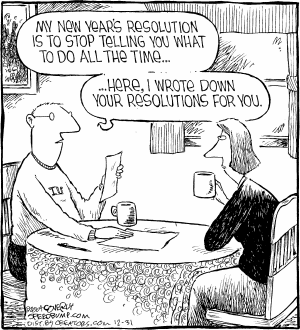This is a very insightful article by Condor Options on the wisdom of taking the "you" out of "your trading." Acknowledging that our perception of our free will is much greater than our actual free will, leads to the recognition that controlling our behavior by making resolutions to do better is a highly flawed trading strategy…
An Antihumanist New Year’s Resolution
Courtesy of Condor Options.
Our New Year’s resolution is to exert as little control as possible over our trading.
Why? Because humans are terrible at decision-making, at changing, at acting in any way other than we have in the past. On a collective level, we can’t seem to stop foisting unnecessary wars and economic crises on ourselves; as individuals, we only rarely pursue our real long term best interests. Human behavior is like a stock whose long term moving average never changes direction: sure, there may be some brief crossovers of shorter term averages, but reversion to the trend is ineluctable and fierce. If you’re a naturally amazing discretionary trader, that’s great news; but since such creatures do not exist, the only answer for the rest of us is to reduce the impact of human behavior on trading decisions as much as possible.
 The best science we have to date suggests that the perception we have of ourselves as free in any classical sense is probably just a grand fiction. For example, some neuroscientists have shown that the feeling of making a conscious decision to act is temporally preceded by subconscious frontal and parietal brain activity (Haggard 2005, building on Libet 1983), such that perceptions of conscious control are probably retrospectively-created inferences rather than coincident observations. Similarly, psychologists like (Wegner 2002) discuss how simple it is to induce rational agents into wildly mistaken beliefs about which actions they did or did not cause.
The best science we have to date suggests that the perception we have of ourselves as free in any classical sense is probably just a grand fiction. For example, some neuroscientists have shown that the feeling of making a conscious decision to act is temporally preceded by subconscious frontal and parietal brain activity (Haggard 2005, building on Libet 1983), such that perceptions of conscious control are probably retrospectively-created inferences rather than coincident observations. Similarly, psychologists like (Wegner 2002) discuss how simple it is to induce rational agents into wildly mistaken beliefs about which actions they did or did not cause.
So perceptions that we have free will or conscious control may be mistaken; what about the fact of control? It is reasonable to wonder whether genetic and memetic influences account for a far greater portion of our actions than has previously been assumed. (Stanovich 2004) And even a genuine ontological independence may be indistinguishable from a sufficiently complex computational process (cf. emergentism in the social sciences).
The good news is that first-order control over individual day-to-day decisions may not be so important anyway. Far more important is the capacity to make second-order choices about which first-order desires we want to have. (Frankfurt 1988) For example, an alcoholic who can’t stop drinking may be unfree in a first-order sense, but if he possesses a genuine desire to stop, he is free in a second-order sense. We might call someone free in general when their second-order volitions determine their first order volitions (i.e., when the alcoholic’s desire to stop results in actually stopping). The trick, of course, is to make conditions as favorable as possible for those second-order volitions.
For traders (and humans generally), the salient point here is that being a successful agent has much more to do with creating the conditions for success than with “conscious” decision-making. New Year’s resolutions to lose weight, spend more time with the kids, learn to dance, or stop making trades based on some “gut feeling” will only succeed when they are pursued in a way that actually assumes our first-order unfreedom.
Practically speaking, that means coercing our future selves into doing the right thing, whether by removing temptations, by raising the stakes such that the cost or embarrassment of failure is greater than the perceived benefit, or etc. In other words, “resolving” to do something is as laughable as “choosing” to levitate: the only decision that matters is the one that actually removes conscious human endeavor from the conditions of success.
Applied to trading, that means making profits and losses have as little to do with human behavior as possible. Trading only mechanical, quantitative strategies is a major step in the right direction, but it’s important that one’s trade allocation and execution be rigorously rule-based as well.
Image courtesy of Flickr user hilabean, who is also mentioned here.



